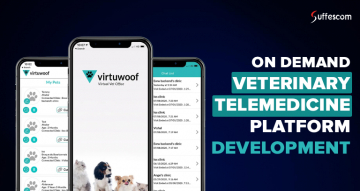ERP AI Chatbot Development: Features, Benefits, Cost & How to Get Started

In today’s dynamic business environment, organizations are constantly adopting intelligent automation solutions to stay competitive and efficient. One such solution gaining momentum is the ERP AI chatbot—a powerful tool that integrates artificial intelligence into Enterprise Resource Planning (ERP) systems.
By enabling businesses to automate repetitive tasks, streamline workflows, and provide real-time data access, ERP chatbots free up human resources for strategic decision-making. This guide covers everything you need to know about ERP AI chatbot development, including features, benefits, cost factors, development steps, and more.
What is an ERP AI Chatbot?
An ERP AI chatbot is an advanced digital assistant that leverages artificial intelligence to interact with users, answer queries, automate tasks, and access real-time data from ERP systems. These chatbots are designed to work across platforms, web, mobile apps, or internal portals—offering 24/7 assistance to employees and users.
Market Trends and Adoption Insights
According to recent studies:
- 30% reduction in response times has been observed in companies implementing ERP AI chatbots.
- Over 70% of enterprises believe AI-powered ERP tools improve productivity and reduce operational costs.
This rise in adoption underscores the importance of choosing the right ai chatbot development company to bring your vision to life.
ERP AI Chatbot Development Services
Transform business operations with an intelligent ERP AI chatbot. Automate tasks, enhance user experience, and get real-time insights. Contact us today to start building your custom solutions.
Key Benefits of ERP AI Chatbots
Implementing ERP AI chatbot solutions can unlock a wide range of benefits for businesses:
- Improved Efficiency – Automates routine tasks like data entry, reporting, and issue resolution.
- Cost Savings – Reduces dependency on manual support, cutting customer service and operational costs.
- Real-Time Decision Making – Provides employees with instant access to ERP data for faster decisions.
- Enhanced User Experience – 24/7 availability ensures users get support anytime.
- Employee Satisfaction – Minimizes repetitive work and improves internal resource access.
- Faster Onboarding – New employees can use chatbots for guided ERP navigation.
- Scalability – ERP AI chatbots can easily scale with growing business demands.
ERP Chatbot Development Solutions and Their Types
There are various types of ERP chatbot development solutions with unique use cases. Businesses can select between on-premise or cloud-based options. Each solutions comes up with unique benefits and fewer drawbacks, allowing organizations to choose what is best for their business. Entrepreneurs can choose one that fits their unique business model. Moreover, these chatbots are customizable to integrate with existing ERP systems, which ensures a seamless transition and increases user retention.
Types of ERP Chatbot Solutions
Businesses can choose ERP chatbot development models based on their needs:
- Pre-Built Chatbots – Ready-to-use templates for quick deployment
- Custom Chatbot Development – Tailored solutions for unique workflows
- Hybrid Solutions – Combines pre-built features with custom enhancements
How ERP AI Chatbots Work
ERP chatbots utilize natural language processing (NLP) to respond to user queries. When a user submits a query, the chatbot evaluates the user's input and provides the best answer to help the user promptly. This process involves several key components:
User Interface: This is the front-end aspect of the chatbot that users interact with. It can be integrated into various platforms, such as websites and mobile apps.
NLP: The NLP engine processes user inputs that break down into various known components. It identifies keywords, context and questions to formulate an appropriate response.
Database Integration: The chatbot connects to the ERP system’s database to retrieve or update information. This integration allows the chatbot to provide the most suitable answers to any query based on available data.
Machine Learning (ML): Over time, the chatbot learns from each and every interaction, which means it's kind of a newly formed baby that grows exponentially. It improves its responses by analyzing user feedback and adapting to common queries.
Feedback Loop: Incorporating into the feedback loop ensures that the chatbot continuously improves its functionality. Users can rate responses, which can help the chatbot improve the NLP model.
Features Offered By ERP Chatbot Solutions
ERP chatbot solutions come up with important features to optimize the tedious operational tasks of any business. Here are some of the key features involved with ERP chatbots:
1. 24/7 Accessibility: Humans are not available 24/7, whenever needed. Thus, chatbots are there for all day and night.
2. Multi-Channel Support: ERP chatbots can operate across various platforms, including websites, and mobile apps, that help enhance the accessibility of the chatbot apps.
3. Data Analytics: Chatbots collect given prompt data and relevant information from each interaction that has been made throughout.
4. Task Automation: ERP chatbots can automate tedious tasks, such as data entries, and reports generation. These chatbots help organizations to free up the staff from doing such things and help them to involve their time in more important and strategic tasks.
5. Personalization: Chatbots can provide personalized responses and recommendations by analyzing user interactions, enhancing user satisfaction.
6. Third-Party Integration: Many ERP chatbots can easily be compatible with third-party enterprise solutions. This provides a more suitable environment for a business to operate casual activities more conveniently.
7. Multilingual Interactions: Multilingual support is essential for MNCs. Thus, many chatbots offer multilingual capabilities to reduce language barriers.
8. Security Features: Many ERP chatbot solutions include robust security measures to protect sensitive data and information from any cyber threats.
This type of real-time automation is made possible through professional AI integration services, ensuring a seamless fit into your existing digital ecosystem.
ERP Chatbot Development: Transform Business Operations & Service
Revolutionize your business operations with an intelligent ERP chatbot. Streamline workflows, automate tasks, and enhance customer service. Get in touch today to create your custom ERP solution.
Benefits Of ERP Chatbot Solutions
There are many benefits of ERP solutions. Here are some of the following:
1. Improved Efficiency: By automating the manual tasks, companies can reduce the workload from the staff. It would help employees of the company to focus more on strategic and important work at the same time. An AI chatbot can provide proactive support, alerting users to issues before they escalate. This capability enhances customer satisfaction and retention.
2. Cost Savings: Using an ERP chatbot can help you save time and money as chatbots can reduce the need for customer service executives to answer any basic query the customer raises.
3. Improved User Experience: With instant 24/7 accessibility and instant responses from chatbots, your users and staff will enjoy a more convenient experience within an organization. AI chatbots can be used in organizations to improve the overall accuracy of information within the ERP system by reducing human errors.
4. Prompt Decision Making: With real-time access to information, employees can make informed decisions promptly on behalf of the company's well-being that helps gaining a competitive edge.
5. More Scalability: ERP chatbots can easily scale up to meet increasing market demands and related customer inquiries. This flexibility ensures that organizations remain efficient while handling the immense pressure from market demands.
6. Increased Employee Satisfaction: Employees having job satisfaction as they have easy access to relevant information via the help of ERP Chatbots. A centralized information source allows employees to get information more effectively, improving workflow efficiency and task completion.
7. Training Time Reduction: New staff of the company can quickly learn how to interact with the chatbot as it provides an onboarding guide that significantly reduces the overall training time. The employees can quickly access information and resources through the chatbot, which speeds up the onboarding process.
ERP Chatbot Development Process
Partnering with the right AI development company ensures you follow a structured development cycle:
Here are the main steps involved in ERP AI chatbot development:
Research: We identify the specific goals the client wants to achieve with the chatbot. This could include which type of task they want to automate, or what tasks they need to enhance.
Design the Conversation Flow: It is crucial to create a clear and intuitive conversation flow. A Professional team of mobile app development will map out potential user queries and determine how the chatbot will respond.
Initialization of Development: Once the flow is designed and finalized by the client, developers start the ERP chatbot development. This step includes integrating it with the ERP system and other necessary tools.
Testing the Flow of Chatbot: Rigorous testing is essential to ensure the chatbot functions as intended. Businesses should conduct both functional and user acceptance testing.
Launch and Monitor: After testing, the chatbot can be launched into the premises. There would be continuous monitoring and maintenance necessary to ensure its effectiveness.
Gather Feedback: It is crucial to collect user feedback after the launch. This information can help in future improvements and updates according to the needs of the client.
Regular Updates: As business needs evolve, the chatbot should be updated regularly to include new functionalities and features.
How Much Does It Cost to Build an ERP AI Chatbot?
Understanding the AI development cost is key before starting your project.
- Basic ERP chatbots start at around $20,000
- More complex bots with deep ERP integration can cost significantly more
Pre-built solutions are cost-effective, but if you need flexibility, custom development offers more ROI. If budget and time are concerns, hire AI engineers with ERP experience to fast-track your development efficiently.
Conclusion
ERP AI chatbots represent a significant opportunity for businesses looking to enhance operational efficiency. Such chatbots can convert how organizations run by automating tasks, and providing real-time data access. Since technology continues to grow, ERP chatbots' capabilities will only expand, making them invaluable tools for future business success.
Investing in ERP chatbot development is not a flaunting trend; it's a good initiative toward building a business structure that works nowadays. In a fast-paced environment where time is money, adopting chatbots can give enterprises a competitive edge that reduces working time.
As organizations continue to explore innovative solutions, ERP chatbot technology will undoubtedly play a crucial role in shaping the future of business operations. By embracing this technology, companies can ensure they are well-equipped to meet the challenges of tomorrow and achieve lasting success.
FAQs
Q1. What does an ERP AI chatbot do?
It automates ERP-related tasks, assists users in real-time, and integrates seamlessly into platforms like SAP, Oracle, or Dynamics.
Q2. How long does it take to develop a custom ERP chatbot?
Timelines vary from 4–12 weeks depending on features and ERP system complexity.
Q3. Are ERP chatbots secure?
Yes, they include encryption, authentication, and secure API practices to protect sensitive enterprise data.
Q4. Which industries benefit from ERP AI chatbots?
Manufacturing, retail, logistics, healthcare, and finance are top adopters due to high process complexity.
Q5. Can I integrate a chatbot with my current ERP system?
Absolutely. Professional AI integration services ensure a smooth and customized integration.








